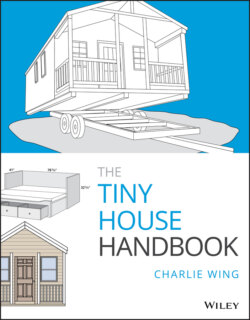Читать книгу The Tiny House Handbook - Charlie Wing - Страница 26
Zoning
ОглавлениеA town zoning ordinance specifies how its land may be used. The ordinance is enforced by an appointed planning board of 3 to 7 residents. Items in the ordinance usually include:
Use zones, for example: agricultural, commercial, residential, conservation
Minimum lot size, for example 2 acres for residential
Minimum setbacks of buildings from property lines, for example 20 feet
Minimum habitable area of residential buildings, for example 800 sq.ft.
Maximum building heights, either in feet or floors, above grade
Activities permitted and forbidden
Offstreet parking requirements
Accessory Dwelling Unit (ADU) regulations
In most jurisdictions the zoning ordinance is posted online. It may also be available for purchase. After choosing a geographic area for your site your first step is to become familiar with each candidate town’s zoning ordinance with an eye to spotting possible roadblocks to your tiny house plans.
If the tiny home of your dreams is on wheels, chances are great you will encounter a problem right away. Although your tiny home is an actual wood-framed house built on a trailer it is, strictly speaking, neither a house as commonly defined nor a trailer. The closest legally recognized category is a camper trailer, and most zoning ordinances forbid the permanent occupation of camper trailers on residential lots. This is, one hopes, a temporary issue because tiny houses, on or off wheels, offer affordable solutions in a time of increasing housing shortages. If you find your town’s ordinance is not favorable to tiny homes, then request they update it to include them. Contact your local tiny home manufacturer if you need help. In the meantime you will probably be able to park your tiny home on wheels in back of a friend’s or relative’s home—at least until someone complains—or in a designated mobile home or tiny home park.
Provided, however, your vision of a tiny home is one sitting on a foundation in a permanent location, familiarize yourself with the zoning ordinances of each of your target towns. Then schedule appointments with a building code official in each. IMPORTANT: These are human beings performing an important service for the good of the town and its citizens. Treating them with respect for their public service and their knowledge (many are retired builders, plumbers, or electricians) will usually result in their respecting you and your project in return. You are not there to demand their approval; you are there to request their guidance in realizing your dream.
Your first meeting will be for gathering information prior to purchasing land and drawing plans. Once you feel the official is engaged and at least somewhat encouraging, ask if they could help by supplying the answers to a list of specific zoning questions. Assuming the answer is yes, complete a copy of the survey form on the facing page.
